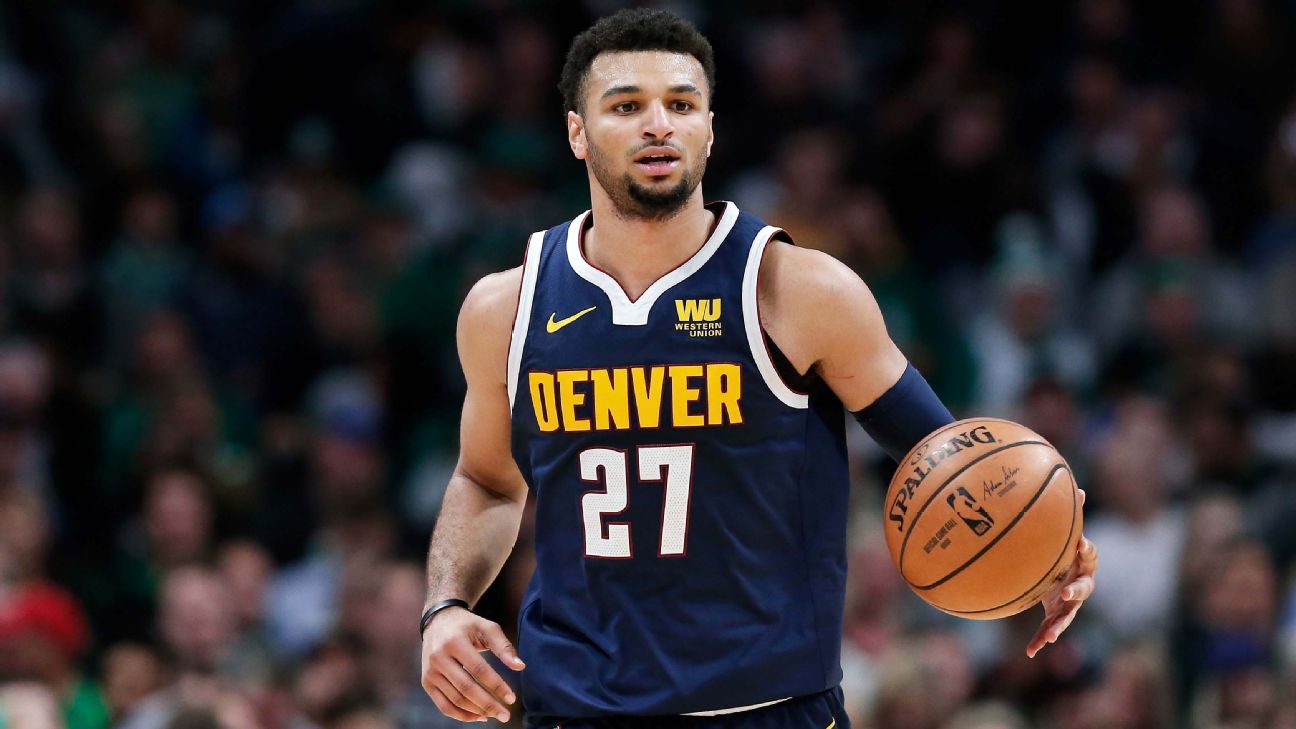On a gloomy mid-December afternoon at the Nuggets’ practice facility, Jamal Murray aggressively handles the basketball, punishing it with each shot that falls short. In just over a day, he will face off against Russell Westbrook, the formidable star from the Oklahoma City Thunder, who plans to dominate the young 21-year-old point guard from Denver. Murray eagerly anticipates matchups against players of Westbrook’s caliber, recognizing his status as an MVP, triple-double virtuoso, and a widely recognized name among the basketball elite.
However, Murray’s practice session is unexpectedly cut short by the coaching staff due to a nagging shin injury. Sitting out of practice is something Murray despises; he finds it difficult to remain still. He fidgets restlessly, his legs jangling, ball bouncing, foot tapping, and hands flexing.
Once the team’s workout concludes, Murray casually heads out to the court to take some extra shots, despite Nuggets coach Mike Malone’s preference for him to rest.
As Murray releases his first shot, he winces as it falls short, clanging against the rim. He misses again, growing increasingly frustrated and expressing his annoyance through a string of expletives. After his third consecutive missed jumper, Murray clutches his head as if he has just missed the shot that would have secured a championship victory. Malik Beasley, Murray’s friend and teammate, explains, “That’s because Jamal believes that every single one of his shots should find the net.”
Murray has dedicated his entire life to sinking these shots under far more challenging circumstances than a well-lit, state-of-the-art gymnasium with regulation balls and rebounders to assist him. 
Imagine shooting three-pointers outdoors, battling the snow and the harsh Ontario wind, immediately after enduring a grueling 12-minute deep-knee squat while carefully balancing a cup of scalding hot tea on your thigh to ensure you remain steadfast. All of this takes place under the watchful eye of Murray’s father, Roger Murray, a martial arts enthusiast and basketball aficionado who has been refining his son’s skills since he was a baby.
Father and son, Roger and Jamal Murray, are united in their pursuit: to demonstrate not only that this talented Canadian can thrive in the basketball world but also that he has the potential to become one of the best, if not the absolute best, in the NBA.
“It’s quite amusing — in his rookie year, he couldn’t make a shot,” remarks Doc Rivers, the coach of the LA Clippers. “I told Lawrence Frank, the president of basketball operations, ‘That kid is going to lead the league in scoring one year.’ Lawrence looked at me as if I were crazy.
He asked, ‘Why would you say that?’ And I replied, ‘Because he’s fearless. He’ll give himself a chance because he genuinely believes he’s the best scorer out here.'”
Currently, Jamal Murray is an essential contributor to the young Denver team, averaging 18.8 points and 4.9 assists per game. However, he acknowledges that his teammate Nikola Jokic is the best player on the team. Jokic, a laid-back 7-foot Serbian, possesses natural talent despite his unimpressive physique during the 2014 NBA draft. While Murray actively seeks scoring opportunities, Jokic, a gifted playmaker shooting at an impressive 51 percent, tends to be more hesitant to take shots. Jokic jokingly remarks that Murray wants to fight him when he passes up scoring opportunities.
Murray’s relentless shooting mentality is evident as he frequently visits the practice facility multiple times a day. There was a night when he practiced pull-up shots until the early hours of the morning, followed by studying film in the players’ lounge. The next morning, Nuggets staff members found him asleep on the couch.
Just eight weeks ago, Murray spent an extensive amount of time perfecting his three-point shooting, a skill that is considered exceptional even when connecting 45 percent of the time. After the intensive practice session, he was so exhausted that he overslept and arrived late to the team’s shootaround before a game against Atlanta, resulting in Monte Morris taking his place in the starting lineup.
Denver’s president of basketball operations, Tim Connelly, acknowledges Murray’s effort but emphasizes the importance of balance and taking care of his body. He encourages Murray to reduce his excessive training sessions, but Murray remains defiant, stating that they can’t stop him. His martial arts training has instilled in him the belief that a disciplined mind can push past perceived physical limitations. Murray understands the team’s concerns but remains determined to follow his own path.
The core of Denver’s young team consists primarily of late-round draft picks and undrafted players, with Murray being the exception as the seventh overall pick in the 2016 draft. Murray feels a deep sense of responsibility towards his franchise and his father, who shares his dreams. He strives for more than just being a competitive team in the Western Conference. This is evident in his willingness to stand up to anyone, exemplified by his confrontation with Russell Westbrook during a December victory over the Thunder when Westbrook attempted to intimidate him during a jump-ball situation.
Murray’s relentless pursuit extends to every shot he takes, regardless of its difficulty. Each shot is a result of the meticulous crafting, practice, and refinement he has undergone with his father. Fatigue and injuries are not excuses for him. Murray sees the NBA as a break from the strict training program he and his father have diligently followed for over a decade.
“After everything I’ve done to get here,” Murray declares, “this is easy.”